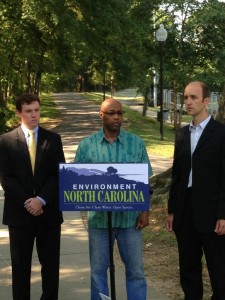
Speaking as a part of a press release about power plant carbon emissions in NC.

Me talking about the state of climate science with Graham Givens of Environment NC, Ronald Ross, local resident and Vice President of Stewart Creek Environmental Association, and reporters!
The press release was at their news site, and they arranged a live release for media. I went to Frazier Park near the heart of the Queen City early in Septemeber to speak about the science, essentially relying on the discussion in IPCC AR4, which is what I discuss in my classes too. I spoke from the position of scientific evidence. The press release at Frazier Park made its way through state and city news outlets, and I thought the reporters did a great job with the write-ups. Here are some links:
I think on the eve of the release of the first part of the IPCC Fifth Assessment Report, it’s important to remember that the solution to the problem of global warming, or at least the best way to mitigate the problems, begins at a local level. We have to remember that the carbon emissions in our backyard – which Environment NC highlighted – affect the entire world. CO2 lasts 100-1000 years in the atmosphere so CO2 from North Carolina will be absorbing infrared radiation for a long, long time. Maybe I’ll write an op-ed for the Observer.